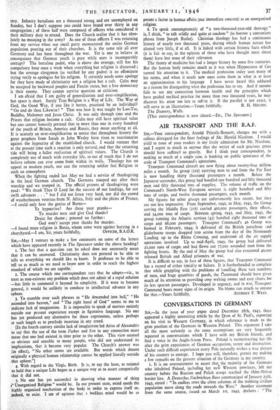Snt,—May I venture to make a few comments on some
of the letters which have appeared recently in The Spectator under the above heading? i. The fact that a question can be asked does not necessarily mean that it can be answered. Christianity does not pretend to be able to
tells us everything we should like to know. It professes to be able to tell us as much as we need to know now in order to reach the highest standard of which we are capable."
2. The course which one correspondent says that he adopts—viz., to treat as non-existent any problem which does not admit of a rapid solution —his little to commend it beyond its simplicity. If it were to become general, it would be unlikely to conduce to intellectual advance in any sphere.
3. To stumble over such phrases as "He descended into hell," "He ascended into heaven," and "The right hand of God" seems to me to
indicate lack of imagination. It is impossible to speak of matters entirely outside our present experience except in figurative language. No one has yet produced any alternative for these expressions, unless perhaps at such length as to preclude insertion in any creed.
[In the fourth century similar lack of imagination led Anus of Alexandria to say; that the use of the term Father and Son in any connection must
mean that one had existed in time prior to the other. This view seemed so obvious and sensible to many people, who did not understand 'its implications, that it became very popular. The Church's answer was (in effect), "No other terms are available. But words which denote originally a 'physical human relationship cannot be applied literally outside that sphere."] 4. With regard to the Virgil, Birth. It is, to say the least, as rational to hold that a unique Life began in a unique way as to assert categorically that it did not.
5. No one has yet succeeded in showing what manner of thing ." Unorganised Religion" would be. In our present state, mind needs the highly organised mechanism of the body in order to express itself or, indeed, to exist. I sin of opinion that 3 bodiless mind would be as
potent a factor in human affairs (our immediate concern) as an unorganised religion.
6. To speak contemptuously of "a two-thousand-year-old theology" is, I think, "to talk wildly and quite at random" (to borrow a convenient phrase from Joseph Butler). Christian theology has had a continuous history of nearly two thousand years, -during which human nature has altered very little, if at all. It is linked with certain historic facts which (it is fair to say, in the opinion of those who have thought most about them) have lost none of their relevance.
The theory of medicine has had a longer history by some five centuries. But the human body remains .much as it Was when Hippocrates of Cos turned his attention to it. The medical profession today uses many of his terms, and when it needs new ones coins them in what is at least an approximation to his language I have never heard this adduced as a reason for disregarding what the profession has to say. And if anyone fails to see any connection between health and the principles which have guided medical practice for more than two thousand years, he may discover his error too late to refrte it. If the parallel is not exact, it will serve as an illustration.—Yours faithfully, R. H. MELDIN. The Deanery, Wells.
[This correspondence is now closed.—En., The Spectator.]






























 Previous page
Previous page